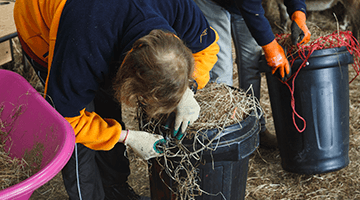For People with Behaviours of Distress (‘Challenging Behaviour’)
People exhibiting behaviours of distress, such as self-harm, aggression, or property damage, often struggle with inclusion due to mismanagement and misunderstanding. At Dimensions, we recognise that these behaviours are forms of communication, not barriers.
What Are Behaviours of Distress?
Behaviours of distress include actions that cause harm or distress to oneself or others, impacting quality of life and limiting activities. Examples:
- Physical or verbal aggression
- Self-injury
- Property damage
Causes
Behaviours of distress stem from unmet needs or communication challenges, often linked to:
- Difficulty understanding surroundings
- Stress or anxiety
- Sensory overload
- Medical conditions or specific triggers
Our Approach
The members of our Positive Behaviour Support team specialise in understanding the roots of behaviours of distress and helping individuals make structured changes to their environment. For example, their staff, housing, what they eat, what they wear or what they do.
As well as this, the team use teaching techniques to teach the individual what to do when they encounter a challenging behaviour trigger.

Dimensions offers tailored support to address these behaviours:
- Co-produced support plans with families
- Positive Behaviour Support to identify triggers and teach coping strategies
- Environmental adjustments, such as housing, staffing, or routines
- Empowering individuals to gain choice and control, often reducing support nee
Results
Through skilled support, many individuals transition to lower support needs, freeing resources for more enriching life experiences.
We understand that the support needs to be tailored to every person individually, and we take a person-centred approach to all we do at Dimensions.
You can read real-life stories of the people we support, like Richard and https://dimensions-uk.org/case-study/reducing-self-harm-through-positive-behaviour-support/Paul, to give you a better understanding of the outcomes of our support for people who display behaviours of distress.
Additional Resources
- NHS: Social services and charity support
- Mencap: Learning disability advice line
- National Autistic Society: Family support
- Scope: Advice for families with disabled children
- Challenging Behaviour Foundation: Resources and guidance
To learn more about our services or find local support click the button below:
